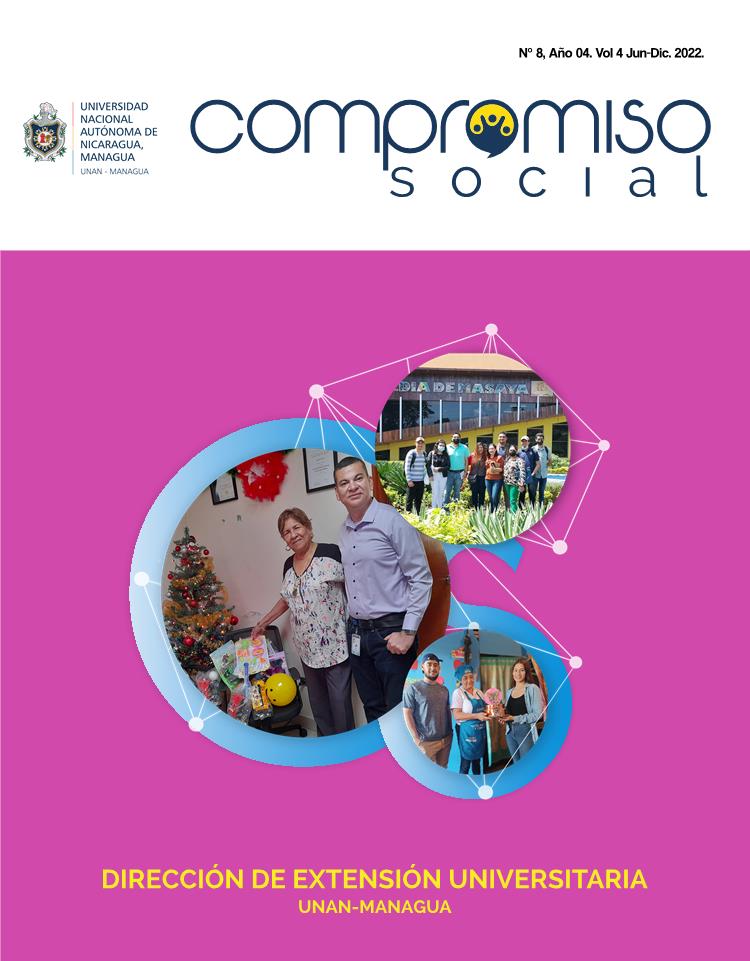University in the Countryside, Restoring the Right to Rural Young People to Become Professionalized
DOI:
https://doi.org/10.5377/recoso.v4i8.18606Keywords:
University in the Field, New School Model, competency, protagonistsAbstract
The University in the Countryside Program (UNICAM), is promoted in Nicaragua, originally by the National Autonomous University of Nicaragua, Managua, UNAN-Managua, with the participation of three more Latin American universities and the advice of two European universities. The original project consisted of developing a Cohort in Sustainable Rural Development, aimed at rural youth in vocational training. The target of the protagonists was 60 beneficiaries per country, divided into two groups of 30 each. Due to the initial demand for protagonists, it started with seven groups and 280 students in both FAREM. In Matagalpa, four groups were opened in the municipality of El Tuma – La Dalia; in Estelí it started with three groups in Miraflor, Moropotente. This vocational training implemented as a pedagogical strategy the New School Model, with a competency-based curriculum. The evolution of the project allowed it to be institutionalized in a Special Program of the UNAN-Managua, increasing greater coverage of rural protagonists, with an expansion of the territories served and professional careers implemented. At first, the municipal governments supported this formation. Currently, there is support from the CNU, to continue restoring the right and opportunity to rural youth to enter Higher Education. The objective of this article is to describe the implementation of the UNICAM Program in these ten years of evolution, highlighting its stages to become a public policy to restore the right of young people and rural communities to professionalize. The methodology that was carried out for the construction of this research was the documentary review of the Program, reports, monographs and theses that have been generated in it, carried out on the Program, as well as interviews with the UNICAM coordinators of the FAREM of the UNAN-Managua. This article aims to show how the UNICAM Program contributes to the restitution of the rights of rural youth to vocational training, with an inclusive, multiethnic, multicultural education, with a gender focus, at the service of the community, with love for the environment, entrepreneurial and for the benefit of the community.
Downloads
References
Centro de Investigación y Acción Educativa y Social (CIASES), (2008). La Educación Rural Nicaragüense. Hacia un diagnóstico de sus desafíos y posibilidades. Informe de Investigación preparado para el Servicio Holandés de Cooperación (SNV). Managua, Nicaragua. 52 p.
Comité Departamental de Cafeteros de Caldas, (2006). En Caldas 25 años de Metodologías Escuela Nueva un Modelo Pedagógico exitoso que se ha extendido por el mundo. Comité de Cafeteros de Caldas. 59 Boletín. Colombia, Manizales, Caldas. 5 pag.
Gobierno de Reconciliación y Unidad Nacional (2021). Plan Nacional de Lucha contra la Pobreza (2022 – 2026). Nicaragua 189 p. En línea https://www.pndh.gob.ni/documentos/pnlc-dh/PNCL-DH_2022-2026(19Jul21).pdf
Laguna, J.C. (2020). Análisis de la implementación del proyecto Universidad en el Campo y de la carrera Desarrollo Rural Sostenible, en el período 2012-2017. Tesis Doctoral. UNAN-Managua – FAREM Matagalpa. 323p
INIDE (2016). Reporte de Pobreza y Desigualdad EMVN 2016. Encuesta Nacional de Medición de Nivel de Vida. Disponible en línea en: http://www.inide.gob.ni/Emnv/Emnv17/Reporte%20de%20Pobreza%20y%0Desigualdad%20-%20EMNV%202016%20-%20Final.pdf
Peirano, C., Estévez S. & Astorga, M. (2015). Educación rural: oportunidades para la innovación. Cuadernos de Investigación Educativa, 6(1), de http://www.scielo.edu.uy/scielo.php?script=sci_arttext&pid=S1688-93042015000100004&lng=es&tlng=es
Programa ALFA. (2010). Contrato de Subvención a proyectos en el marco del Programa ALFA. La Universidad en el Campo, Programa de Formación Superior Agropecuario para Jóvenes Rurales. Universidad de Caldas, Colombia.
Downloads
Published
Issue
Section
License
Copyright (c) 2022 Universidad Nacional Autónoma de Nicaragua, Managua(UNAN-Managua)

This work is licensed under a Creative Commons Attribution-NonCommercial-ShareAlike 4.0 International License.




